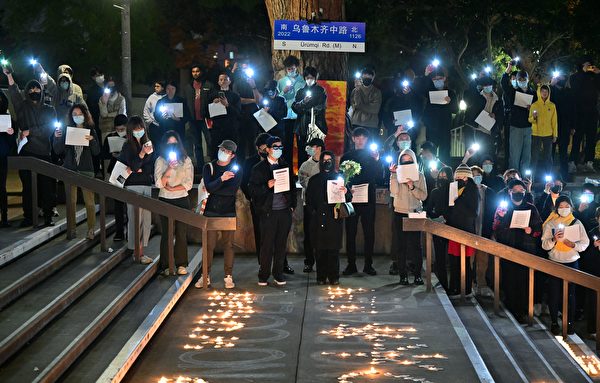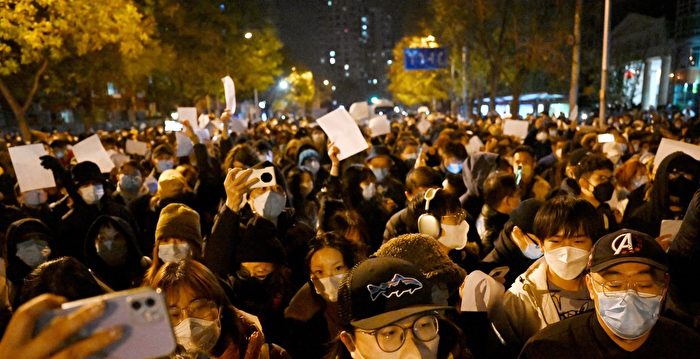[The Epoch Times, December 07, 2022](Comprehensive report by Epoch Times reporter Song and Tang) In 2020, in the early stages of the epidemic, the CCP used high-pressure means to forcibly clear the city, but new and more infectious strains emerged, clearing the city. The zero policy can no longer be maintained. People can no longer bear the three-year blockade. At the end of last month, the “white paper movement” broke out to protest the zero policy, and shouted “Communist Party step down” and “Xi Jinping step down”. slogan, the CCP’s campaign-style epidemic prevention has exposed its autocratic weakness.
The Chinese Communist Party is in a dilemma
In 2020, after the outbreak of the epidemic in the United States on a large scale, the Trump (Trump) administration formulated the “Operation Wrap Speed” (Operation Wrap Speed) to develop a vaccine against the virus in time and adopt the strategy of “coexisting with the virus”. Years later, the epidemic basically subsided. However, the CCP’s response method is different. The focus of epidemic prevention is not the virus, but clearing and closing the city to restrict people’s freedom of travel.
Recently, a number of Western media have published articles saying that as of today, the zero-clearing policy has brought the CCP authorities into a dilemma. If the blockade continues, it will further damage China’s economy, and people’s tolerance has reached a critical point.
At present, the number of domestic flights in China has decreased by 45% year-on-year, road freight has decreased by 33%, and urban subway traffic has decreased by 32%. The urban youth unemployment rate is almost 18%, almost double the rate in 2018.
Epidemic prevention experts said that the zero-clearing policy of the CCP authorities isolates people from the virus and suppresses people’s immunity from exposure to the virus. The authorities are busy with large-scale nucleic acid testing and building isolation facilities, neglecting vaccination and increasing the number of intensive care beds in hospitals.
Lawrence Gostin, director of Georgetown University’s O’Neill Institute for National and Global Health Law, told the tech news site Grid that “China’s ‘dynamic zeroing’ strategy is not sustainable and will almost certainly be lost over time. And failed. SARS-CoV-2 is too contagious to control, especially in a population with very low natural or vaccine-induced immunity, and if China abruptly ends its zero-out strategy, it will see An explosion in hospitalizations and deaths.”
Michael Lindell, a disaster preparedness expert at Texas A&M University, said, “China (the Communist Party of China) chose to block it as much as possible. Even if the virus becomes a more contagious variant, it seems that the Chinese (Chinese Communist Party) government has chosen to Risk. They may have overestimated their ability to block, or underestimated the length of time to block.”
Harvard University professor William Kirby (William Kirby) said: “China’s hospitals have not been built, and the zero-clearing policy is very unpopular, showing the weakness of an authoritarian system in responding to change.”
In fact, the “zero policy” of isolation from the virus not only put people’s health at risk, but eventually led to the outbreak of a “white paper movement” against zero.
Political movement-style epidemic prevention provokes outrage
Commentators often compare the zero-clearing policy with Mao Zedong’s “Striking Sparrow” campaign. The main purpose of both is not sparrows or viruses, but to train the people and cadres to be loyal to the Communist Party and its supreme leader.
Political campaign mobilization is usually an opportunity for officials large and small in the CCP system to show their loyalty. In a speech on epidemic prevention in January 2020, Xi Jinping clearly stated that “party committees at all levels must inspect and identify cadres in the practice of this severe struggle”, and set the criteria for employment as “dare to fight” and “dare to take responsibility”.
Since the 20th National Congress is a watershed for many officials’ careers, cadres at all levels showed their “dare to fight” and “dare to take responsibility” in order to show their loyalty. Extreme measures such as “find one, extinguish one” and “quarantine in situ” have been introduced one after another.
Shocking slogans such as “How do children count as filial piety? Make sure parents don’t go out”, “Today visits, tomorrow to the grave”, “To visit is to kill each other, and to gather is to commit suicide” and so on.
In the spring of this year, Li Qiang, Xi’s confidant, sealed off Shanghai for two months. When many residents were short of food, unable to seek medical treatment, and the situation was very urgent, the government was still bombarding propaganda about how officials should perform their duties and how reasonable the blockade was. Afterwards, the outside world expected that Li Qiang’s official career would be affected, but at the 20th National Congress, because of his faithful implementation of the zero-clearing policy, Li Qiang was instead promoted to the No. 2 figure in the party.
In the process of clearing the blockade, local governments and party organizations described the epidemic prevention as a “defense war”, and the officials themselves were the “commanders”, using community personnel, civilian police, auxiliary police, grid officers, security guards and volunteers to establish A strict “wartime” monitoring system was established, all sources of information were controlled, and residents’ most basic personal rights and freedoms were deprived.
A recent example is the “kneeling woman” incident in Guangzhou that was circulated on the Internet. Two women had an argument with the epidemic prevention personnel, and the epidemic prevention personnel did not hesitate to kneel on the ground with their hands behind their backs.

Some netizens commented, “Three years of the epidemic, the security guards think they are the police, the property owners think they are public institutions, and the neighborhood committees think they are the courts.”
In September of this year, an incident in which 27 people were killed when a bus in Guiyang overturned due to excessive epidemic prevention aroused the sympathy of the public that “we are all sitting on that bus”.
The CCP authorities have used “political campaigns” to deal with the virus, and scientific and common-sense discussions have been silenced, and public discussions on the concepts of “herd immunity” and “coexisting with the virus” have been basically banned.
The CCP has now established a panoramic digital social surveillance system, with censors gaining access to the smartphone apps that Chinese citizens rely on to communicate, arrange travel and buy essentials.
In April this year, four rural banks in Henan Province were hit by thunder. Depositors had nowhere to ask for their deposits. They went to Zhengzhou, Henan Province to defend their rights. But when I got off the train, the health code inexplicably changed from green to red. Obviously, this is because the authorities have turned epidemic prevention measures into a means of maintaining stability.
“White Paper Movement”
From June to November 22, from social media to street rallies, the American think tank “Freedom House” recorded at least 79 protests against the zero policy. However, most of these protests are dissatisfaction with local governments, which cannot be compared with the national protests, and they do not point the finger at the Communist Party and Xi Jinping.
On November 24, the fire in Urumqi, Xinjiang became a fuse. Due to the blockade of streets, the rescue of fire trucks was delayed, and at least 10 people were burned to death. The anger of the citizens of Urumqi, who have been locked down for three months, overwhelmed their fear. They broke through the blockade and took to the streets to protest. From the 25th to the 27th, protests broke out in at least 15 cities in China, and holding a piece of A4 blank paper became a symbol of this protest.
This protest directly pointed the finger at the Communist Party and its top leader, Xi Jinping.

An unnamed international student at the University of California told The Epoch Times: “The Chinese Communist Party will be overwhelmed by the blank papers of the Chinese people.” He said that international students who have received higher education overseas and have seen the Western civilized world have become sober. “The law gives the people these The right is that the political party (the CCP) does not let people speak; I hope that everyone will unite to resist the CCP, because everyone may be the next Hong Kong person (persecuted by the CCP) and the next Xinjiang person.”
Senator Marco Rubio, a member of the U.S. Senate Foreign Relations Committee, said the protests showed that citizens of any country will stand up for their freedom.
“What we’ve learned is that Chinese people are people. People don’t like being locked up,” Rubio said. “They (Chinese) don’t like being told they can’t go out, they can’t go to work, they can’t socialize, they can’t meet people. Families, not to have fun and play, which their government has been doing for a long time.”
“In every country in the world that tries this kind of management, the people will rebel, even in a totalitarian country like China,” he added. “We’re seeing that happen now.”
Responsible editor: Lin Yan#
